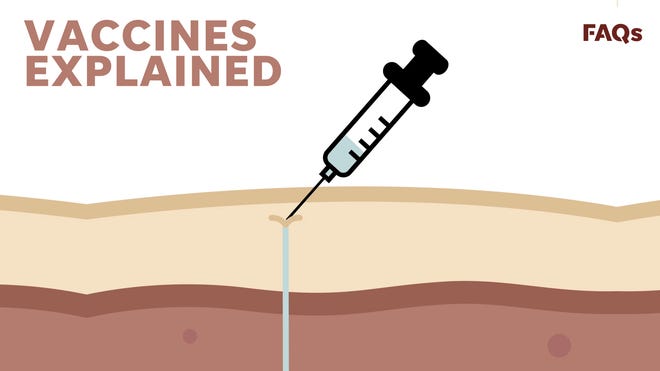Moderna, a Cambridge, Massachusetts-based biotechnology company, announced early Monday that its candidate vaccine, mRNA-1273, developed in collaboration with the U.S. government, appears to be 94.5% effective against the disease.
Earlier this month, Pfizer and its German partner BioNTech, announced early effectiveness data, showing their vaccine, called BNT162b2, had protected more than 90% of those who received it.
Both results are preliminary, with final results expected in as soon as a few weeks.
"This is better than Christmas," said Dr. Monica Gandhi, professor of medicine at the University of California, San Francisco. "The interim results of these two exciting mRNA vaccine candidates over the past week are encouraging, hopeful and move us massively forward to getting out of this pandemic!"
A colleague was equally thrilled.
"There's part of me that tries to hear this as a dispassionate physician, but as a human being, this makes me giddy," said Dr. Robert Wachter, chair of the Department of Medicine at UCSF. "You can really see the light at the end of this tunnel. It's unbelievable."
Moderna's good news also proves that Pfizer/BioNTech's results were not a fluke, he said.
Most of the vaccines under development target the same "spike" protein on the surface of the virus that causes COVID-19. If these two are so effective, he said, it suggests other candidates that target the protein in different ways will also be extremely good at protecting people.
"There's no good reason to believe we won't have one, two, three or four more that are equally effective," Wachter said.
Even before the latest results were made public, people have been fantasizing on Twitter about what they would do once they are protected by a vaccine. The most popular response: Hug a loved one.
Each trial enrolled tens of thousands of volunteers – Pfizer's had 44,000; Moderna's 30,000 – injecting them twice either with the candidate vaccine or a placebo, and then waiting to see if they came down with COVID-19.
In Moderna's first interim analysis 95 people came down with COVID-19, 90 of whom received the placebo. Eleven people – all in the placebo group – developed "serious" cases of the disease. Among the 95 who fell ill, 15 were over 65 years old, 12 were Hispanic, 4 were Black, 3 were Asian and one was self-described as multi-racial, according to a company press release.
A final analysis is expected to include 151 trial volunteers, by which point, statistically, the company can be 90% sure that its findings will hold true.
With the Pfizer/BioNTech vaccine interim results, 94 patients developed the disease, the vast majority of whom had received the placebo, which is how the company calculated that it was 90% effective. The companies will do a final check of effectiveness when 164 study participants have fallen ill.
Both companies are "blinded" to the results until reaching predetermined analysis points, with an independent data safety monitoring board reviewing the data first.
Stéphane Bancel, Chief Executive Officer of Moderna, said in a prepared statement that he was very pleased with the results, and thanked the trial participants and government scientists who helped develop and fast-track mRNA-1273.
“Since early January, we have chased this virus with the intent to protect as many people around the world as possible," he said. “We remain committed to and focused on doing our part to help end the COVID-19 pandemic.”
Other scientists were equally enthusiastic about the results.
"It certainly looks promising," said Dr. Peter Hotez, a pediatrician and dean of the National School of Tropical Medicine at Baylor College of Medicine in Houston, who was not involved in developing any of the COVID-19 vaccines. He said he was encouraged by the results in older people, but wants to see the findings published in a peer-reviewed journal, rather than just a company press release.
"So now Operation Warp Speed perhaps has produced two successful vaccines with an innovative technology," he said, referring to the Trump administration program charged with developing and mass-producing COVID-19 vaccines.
Both the Moderna and the Pfizer/BioNTech candidate vaccines depend on a technology called mRNA that uses the body's natural processes to turn cells into factories producing a protein found on the outside of the virus that causes COVID-19. The immune system then learns to recognize that protein and attack the virus if it appears.

Before the companies can apply to the U.S. Food and Drug Administration for authorization to provide their vaccine to the public, they must jump through several more hoop.
About half the trial participants must be two months past their second shot, to prove that the candidate vaccines are safe. All the vaccines are expected to cause sore arms and a day or two of fatigue and flu-like symptoms, but if someone is going to develop a severe vaccine reaction that is likely to happen within six weeks after receiving it.
Source: USA Today




0 Comments